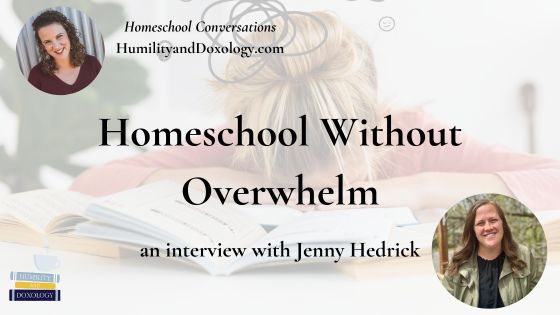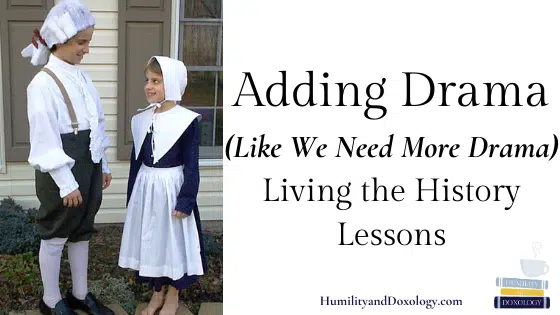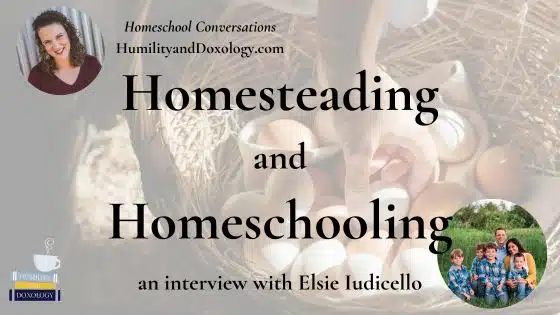Homeschooling can be awesome, but it definitely comes with its own unique set of challenges. From the early days of simple routines to the complexities of managing a growing family’s education, it’s easy to feel overwhelmed at times. In this conversation with Jenny Hedrick from Super Simple Homeschool, we dive into the practical strategies that have helped her family stay grounded, avoid burnout, and cultivate a purposeful, sustainable homeschool experience. We all long for more peace, clarity, and joy into our daily homeschool rhythm. This Homeschool Conversation teaches us how to do just that.
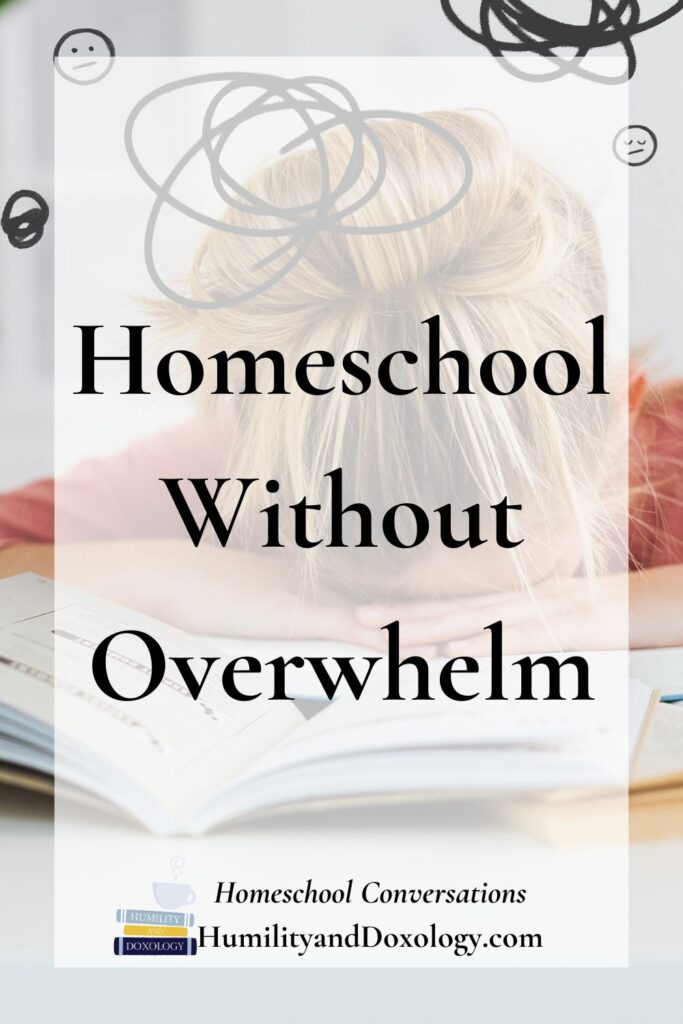
- Meet Jenny Hedrick: Homeschool Mom, Therapist, and Podcast Host
- Shifting Homeschooling Mindsets
- Facing the Challenge of Dyslexia
- Ditching the "Perfect Curriculum" Myth
- Prioritizing Routines That Build Faith and Connection in Your Homeschool
- Why Clarifying Your Purpose Is Key to Homeschooling Success
- How to Prevent Burnout and Overwhelm in Homeschooling
- Key Takeaways
- Listen to the full podcast episode “Homeschool Without Overwhelm with Jenny Hedrick” on Homeschool Conversations with Humility and Doxology
- Find Jenny online
- Check out all the other interviews in my Homeschool Conversations series!
{This post contains paid links. Please see disclaimer.}
Meet Jenny Hedrick: Homeschool Mom, Therapist, and Podcast Host
In this episode, I’m joined by Jenny Hedrick, a homeschool mom from northern Colorado who also works as a mental health therapist and coach. Jenny is the host of the Super Simple Homeschool podcast and an aspiring beekeeper—a fun connection we share, as I mentioned my own family’s ties to beekeeping in Colorado. Jenny shares that her homeschooling journey began about eight or nine years ago when her oldest child was ready to start school. At the time, she had been working full time while her children attended daycare, but she felt a pull toward a different kind of family rhythm.
Surrounded by a community where several families homeschooled, Jenny was inspired by the freedom and connection she saw in their daily lives. She proposed the idea to her husband, who was immediately supportive. They jumped in right from the beginning, and Jenny says she’s never looked back. Now in their eighth or ninth year of homeschooling, Jenny and her husband are raising and educating their three children, ages 12, 10, and 7, and they continue to love the lifestyle they’ve built together through homeschooling.
Shifting Homeschooling Mindsets
When Jenny Hedrick first began homeschooling, she admits she set out to replicate the classroom model she knew from her own private Christian school background. Over time, however, she discovered that homeschooling requires a completely different mindset. Jenny shared how the early years brought frustration as she wrestled with the realization that “school at home” doesn’t have to look like traditional schooling. Each year, she finds herself going through a process of “de-schooling” her own expectations, reminding herself that it’s okay for her children’s learning paths to look different from others and focusing on what truly matters.
What surprised Jenny most about homeschooling wasn’t the challenge of managing daily tasks or being home with her kids—it was the deep emotional and spiritual work required to parent and teach each child according to their unique needs. She reflected on how homeschooling has supercharged her own growth, forcing her to rely on Jesus in new ways. Over time, she’s learned to prioritize relationships over rigid educational plans. Instead of pushing through every difficulty, Jenny now asks whether preserving a strong, lifelong connection with her kids matters more in that moment—and often, the answer is yes. This shift has brought more peace and joy to her homeschool journey.
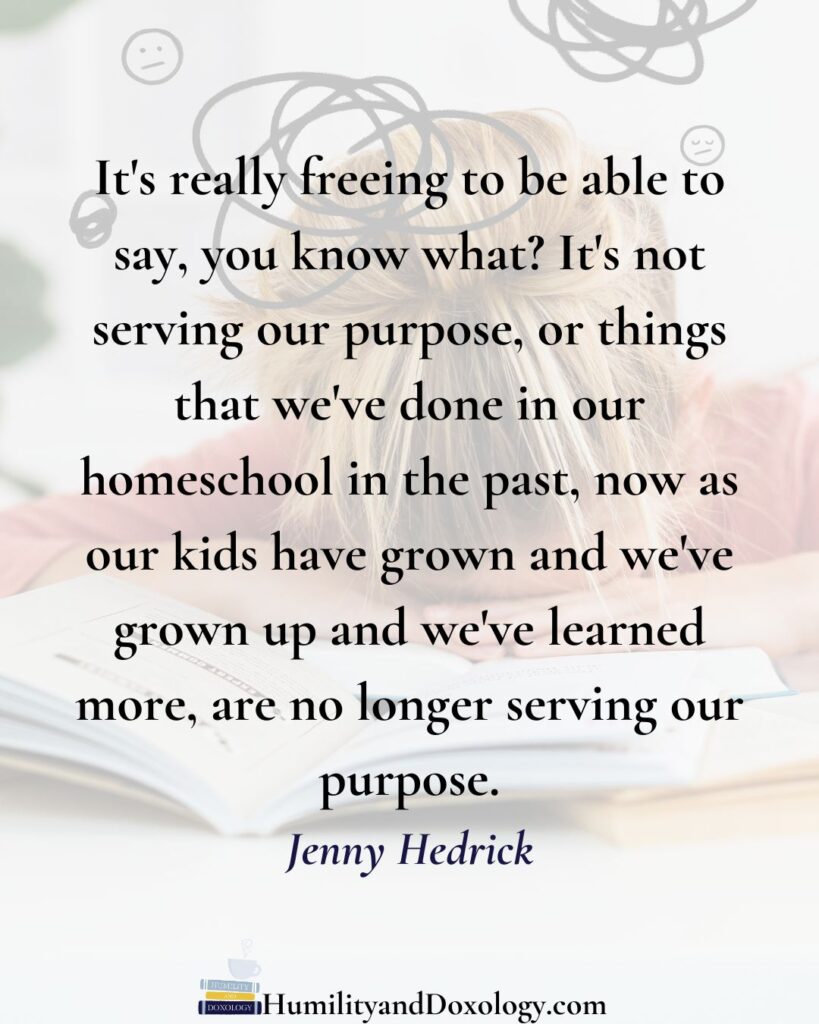
Facing the Challenge of Dyslexia
About four years into her homeschool journey, Jenny Hedrick faced an unexpected challenge: discovering that her oldest son was dyslexic. Though her husband also has dyslexia, Jenny hadn’t anticipated this struggle for her son, especially since he seemed so much like her in other ways. The realization brought a wave of panic and grief as she came to terms with the fact that her son needed far more support than she had planned for. Over time, she also learned that all three of her children have varying degrees of dyslexia, shifting her entire vision for her homeschool.
Jenny shared that overcoming this challenge has been a journey of mindset transformation and deep reliance on God. She reminded herself that her calling to homeschool hadn’t changed just because of this new information. Instead, she committed to learning and growing so she could better serve her children in ways that met their unique needs. While the process has been difficult, it has also been an opportunity for personal and spiritual growth—breaking down expectations and building new skills. Jenny’s story offers encouragement to other homeschool parents navigating learning challenges: while the path may look different than expected, with faith, resources, and a willingness to adapt, it’s possible to thrive.
Ditching the “Perfect Curriculum” Myth
Jenny Hedrick knows firsthand the trap many homeschool moms fall into—believing that finding the perfect curriculum will magically solve all their homeschooling challenges. In her early years, she cycled through multiple all-in-one curriculums, convinced each new resource would finally be the answer. But when her son’s dyslexia diagnosis came to light, Jenny realized that no curriculum could perfectly fit her family’s unique needs. Instead, she recognized that she had been placing too much weight on curriculum choices, thinking they would validate her efforts and guarantee success.
Her breakthrough came when she shifted her mindset: instead of forcing her children into a pre-set mold, she started designing their homeschool around their real-life needs and interests. Today, Jenny blends structured, intensive instruction for reading and math with interest-led learning and notebooking, creating a balance that keeps education effective yet joyful. This approach has been especially valuable during seasons of family stress or transition, reminding her that not everything valuable has to be difficult. Jenny encourages other homeschool moms to let go of the pressure to find the “perfect” tool and instead look for resources that fit their children and their family’s current season—because ease and delight have a rightful place in homeschool learning, too.
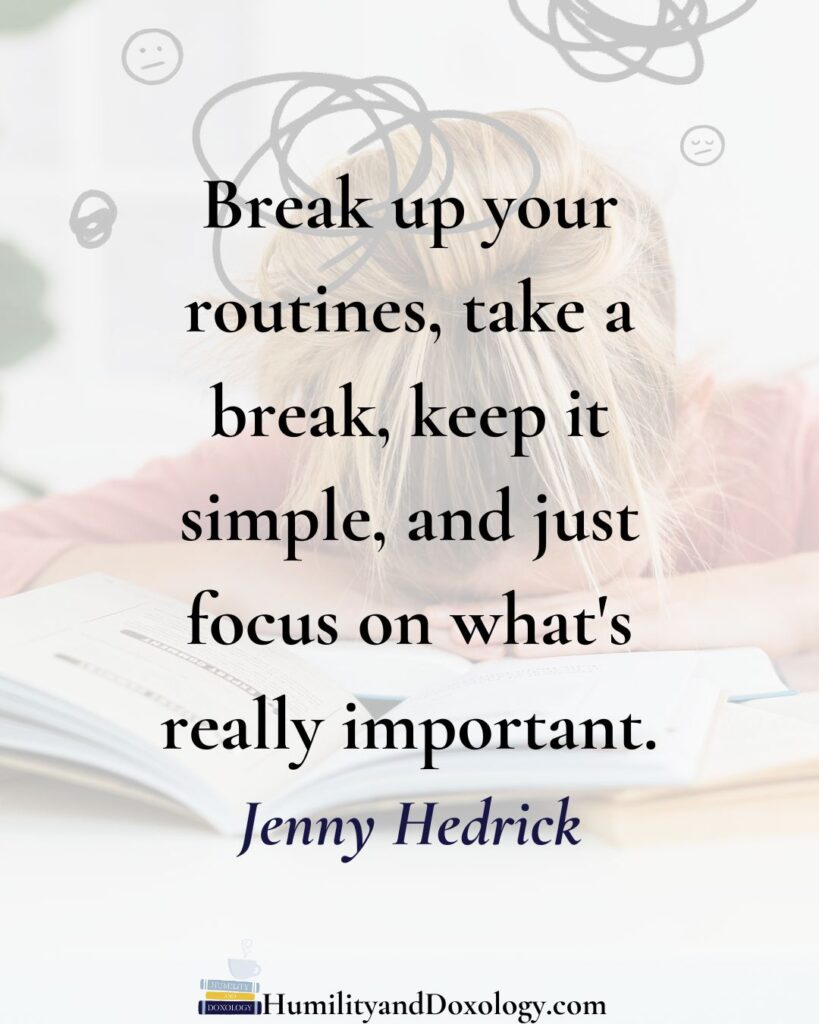
Prioritizing Routines That Build Faith and Connection in Your Homeschool
When it comes to homeschool routines, Jenny Hedrick focuses on what truly anchors her family: faith and connection. She shares that their two main daily routines are bookends to the day—starting with time in Scripture, theology, or catechism each morning, and ending with family devotions or cozy read-aloud sessions in the evening. Jenny explains that making Bible time the first priority ensures that, even if the rest of the day goes off track, they’ve grounded their hearts in God’s word and prayer together.
Beyond the daily rhythms, Jenny’s family also marks their week with intentional togetherness. They’ve incorporated a Sabbath practice, complete with candlelight dinners and one-on-one connection time, creating a special atmosphere that sets the weekend apart. Simple traditions like homemade pizza nights and family movie nights also weave joy and predictability into their schedule.
Jenny’s emphasis on these faith-filled and relational routines highlights an important truth: routines don’t have to feel rigid or dull. Instead, they can provide a sense of belonging and stability—especially valuable when life feels chaotic. Her family’s practices serve as a reminder that meaningful routines can be a source of comfort and joy, keeping families grounded even in challenging seasons.
Why Clarifying Your Purpose Is Key to Homeschooling Success
Jenny Hedrick emphasizes that defining your homeschool purpose is foundational—and freeing. She shares how, early on, she skipped the advice to write down her “why” because she wasn’t sure what her vision was. As a result, she often felt like she was spinning her wheels, distracted by shiny new curricula and uncertain whether she was making the right choices. Everything changed when she and her husband finally took time to define their family’s purpose and values for homeschooling.
Jenny explains that this clarity now guides every decision they make, from choosing resources to deciding which activities to add or let go. It’s become their filter, helping them stay grounded amid the temptation to compare their homeschool to others or chase after every appealing new idea. Rather than being tossed around by doubt and anxiety, having a clear purpose allows them to confidently say no to things that don’t align—and to embrace changes as their family grows.
To help other moms find the same freedom, Jenny suggests asking thoughtful questions like: What kind of people do we want our children to become? How do we want to spend our time as a family? If someone watched our daily life, what would they say we value? She encourages families to think beyond common benchmarks like college and instead consider what lasting impact they hope to make in the time they have together. Jenny even created a worksheet with guiding questions to help moms clarify their unique purpose—a tool she’s happy to share.
How to Prevent Burnout and Overwhelm in Homeschooling
Jenny Hedrick acknowledges that even with clear purpose and nourishing routines, homeschooling can still feel overwhelming at times. She reminds moms that burnout is common and often cyclical—like during the dreary months of January and February. When those hard seasons hit, Jenny’s go-to strategy is to pare everything down. She asks herself: What can I eliminate to make life more manageable? What simple changes will bring more joy and peace?
Jenny encourages moms to give themselves permission to take breaks. For example, if math is a struggle, it’s okay to set it aside for a week and replace it with math games, kitchen math, or real-life skills like balancing a checkbook. She also suggests doing theme weeks, like life skills week (cooking, meal planning, chores) or game school week (playing board games that still build valuable skills). Changing up the routine with spontaneous activities—like a hike, mountain drive, or park visit—can provide a much-needed emotional reset.
I added that after many years of homeschooling, even experienced moms can feel bored or stuck. Small changes, like declaring a “just because day” to explore a local spot, can revive both mom and kids. And while Jenny and I both caution against constantly switching curriculum, we agree that sometimes it’s okay to try something new—especially for mom’s sanity when teaching the same concepts (like fractions or long division) for the fifth time!
Their shared wisdom: keep it simple, embrace the flexibility of homeschooling, and give yourself grace to adapt when you’re feeling burnt out.
As Jenny shared, the key to a successful homeschool lies in defining your purpose, creating routines that nurture family connection, and staying flexible enough to adapt when needed. By focusing on what truly matters—your family’s values, meaningful learning experiences, and the simple joy of togetherness—you can reduce overwhelm and keep burnout at bay. Remember, homeschool isn’t about perfection; it’s about progress, connection, and learning together. Whether you’re facing a tough season or just looking for new ways to refresh your routine, these strategies can help you create a homeschool environment that works for your unique family.
Key Takeaways
- Start Simple When Homeschooling Young Kids
Jenny encourages focusing on family bonding, read-alouds, and light structure in the early years rather than overloading young learners with formal academics. - A Gentle Start Sets a Positive Tone
Gradually easing into routines helps both mom and kids adjust, avoiding early burnout and fostering a love for learning. - Family Routines Evolve with Purpose
Homeschool rhythms should flow from your family’s core values and purpose, adjusting as children grow and needs change. - Defining Your Purpose Grounds Your Homeschool
Clearly identifying why you homeschool helps filter decisions, prevents comparison traps, and brings confidence amidst external pressures. - It’s Okay to Change What No Longer Serves
Jenny shares that freeing yourself from past routines or curricula that don’t fit your current season brings peace and clarity. - Comparison Is a Common Struggle for Moms
Knowing your family’s unique purpose helps resist the temptation to compare your homeschool journey with others. - Prevent Burnout by Simplifying and Resetting
When overwhelm hits, Jenny recommends paring things down, taking breaks, and shifting to life skills or game-based learning weeks. - Seasonal Slumps Are Normal in Homeschooling
Recognizing that dips in motivation (especially mid-year) are common helps moms plan ahead for resets and fresh starts. - Use Your Homeschool Freedom Creatively
Spontaneous days—like nature hikes, park visits, or “just because” adventures—can refresh both mom and kids while still nurturing learning. - Small Changes Keep Long-Term Homeschooling Sustainable
Jenny and Amy both highlight the importance of occasionally changing things up (even curriculum) to keep homeschooling fresh over many years.
Listen to the full podcast episode “Homeschool Without Overwhelm with Jenny Hedrick” on Homeschool Conversations with Humility and Doxology
Jenny is a homeschool mom who works as a mental health therapist and coach. She is also the host of the Super Simple Homeschool podcast. Jenny lives in Northern Colorado and is an aspiring beekeeper.
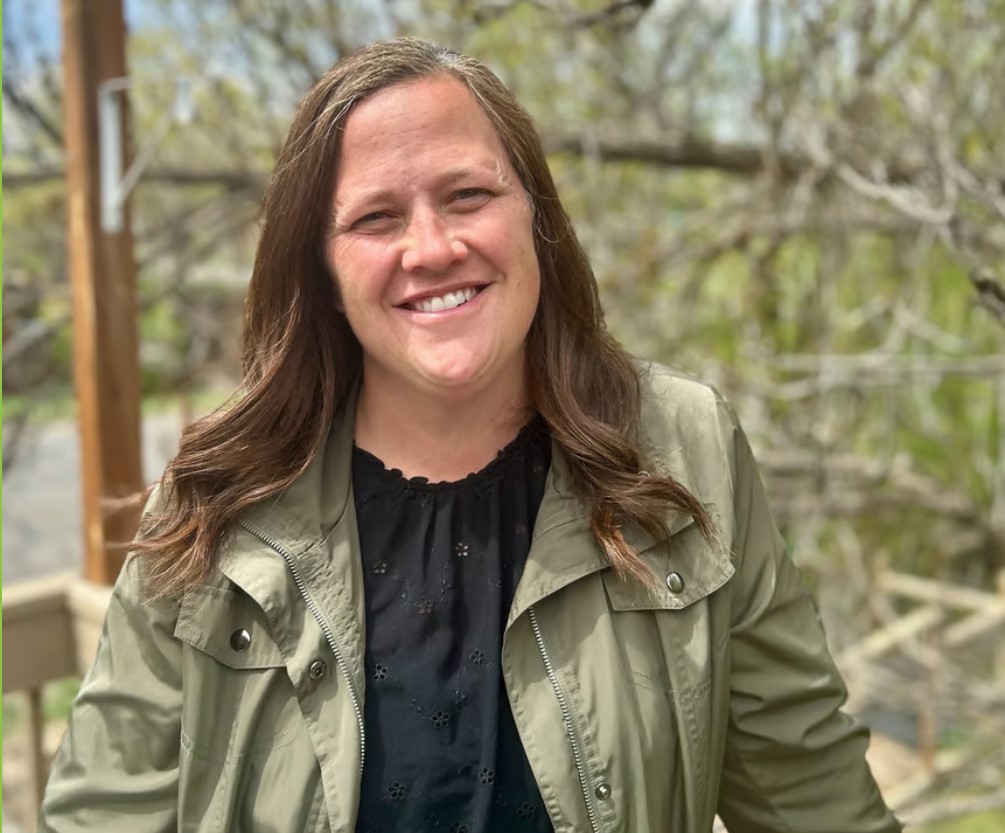
Find Jenny online
Check out all the other interviews in my Homeschool Conversations series!
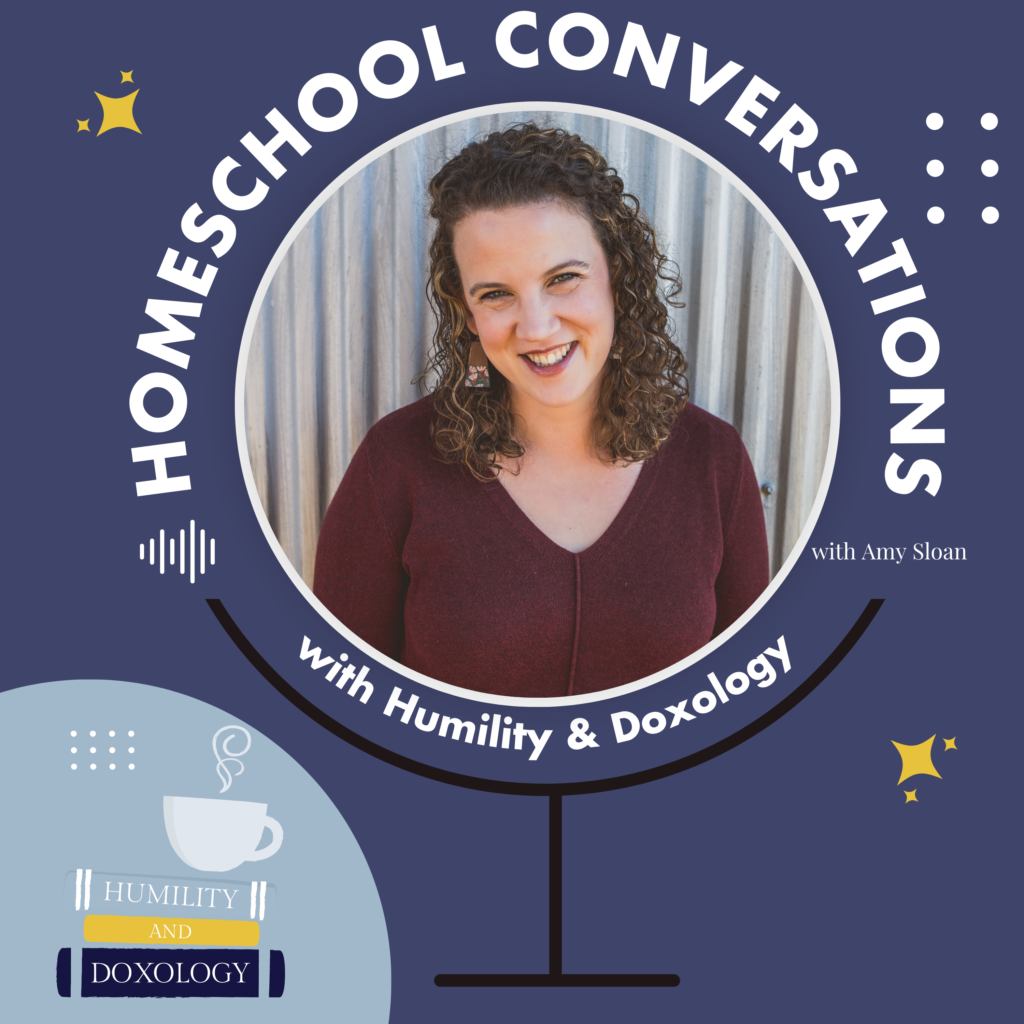
Amy Sloan: Hello, friends. Today I am joined by Jenny Hedrick, who is a homeschool mom who works as a mental health therapist and coach. She is also the host of the Super Simple Homeschool podcast, so check that one out after you finish listening to today’s episode. Jenny lives in northern Colorado and is an aspiring beekeeper, which is fabulous. I actually have family in Colorado, and they sometimes give us some of their honey. They actually do have bees. Wow, awesome. Well, Jenny, here at the beginning, just tell us a little bit about yourself, your family, and how you guys got started homeschooling.
Jenny Hedrick: Sure. Well, let’s see. It was about nine years ago now, I guess, eight. Who can do math on a Monday morning? But it was my oldest was about to start school, and I had been working full time the whole time that my kids were little. They went to daycare, and I kind of knew I didn’t really want to do that anymore, but I had never considered homeschooling. I had a five-year-old and a three-year-old, and I was pregnant. I was a part of a community where there were some homeschoolers, and I had never considered it before, but I loved seeing how they did life as a family and all the things that they got to do because they chose to homeschool. I said to my husband, I said, I want to homeschool our kids, and he said, okay, sounds good to me. I think we are in our eighth or ninth year, like I said, I can’t keep track half the time of homeschooling, and my children are now 12, 10, and seven, just seven. So, that’s how we got started. I was so glad that we started right from the beginning, and I’ve never looked back since, so we love it.
Amy Sloan: Well, what are some of the things that have maybe surprised you the most about homeschooling or things that you thought were going to go one way, and now you’ve seen your approach, your philosophy of education kind of grow and change over those years?
Jenny Hedrick: Oh, man, big time. I could talk about this for a whole day, probably. Sorry. But really, I think I grew up in a traditional school setting. I guess traditional is the wrong word, but in a classroom setting at a private Christian school, and I envisioned education to be like how I knew it and how everybody I knew did school, and so starting out, that’s what I set out to replicate. It took me a long time to recognize that school at home is not the same as school in the classroom, and a lot of frustration, of course, in those early years with making that transition for myself. But every year, I have to go through a process of de-schooling my own mindset. It’s like, okay, it’s okay that we’re not doing X, Y, and Z or that my kids are not at the same level as other kids, their age or whatever the case may be. I have to really remind myself and really work on my mindset every year, and it is a constant process of growth. I think what surprised me the most was how hard it is and not in a way that I thought. I thought it’d be hard being home with my kids all day or just managing all the different tasks and whatnot, but what’s actually hard is being the parent and the teacher and recognizing each kid’s individual needs and trying to meet those needs. You think about the process of sanctification and homeschooling is like a supercharge for that. It breaks everything down spiritually, emotionally, and you have to rely on Jesus in a way different than I ever had before.
Amy Sloan: Yeah, which is such a gift on the one hand because it would be so easy to think, oh, look what a good job I’m doing, right? God loves us too much to leave us there, so he gives us these challenges and opportunities to realize, oh my goodness, I cannot do this or I thought I could do this, but now what I’m doing is not giving me the results that I thought I was going to get. Definitely, I have learned more through parenting, I think, and then homeschooling is just intense parenting all the time. I think that has done the most for causing me to die more and more to myself and to live to Christ, for sure. I really also loved what you said about de-schooling your own mindset because so much of what we do as homeschoolers and some of our problems or hangups can come from just expectations. We don’t always even realize we have preconceived notions, right? I’m a second generation homeschooler, so I don’t come in with the same kinds of preconceived notions, but I have my own ideas about how things are going to go and how kids will respond to my brilliant plans. I think you have that idea I’ve said before to people like, lower your expectations, increase your joy. Sometimes it’s just de-schooling or acknowledging the assumptions we have in our mind and then re-evaluating those more realistically is really helpful.
Jenny Hedrick: Yeah, absolutely. I agree. I think there are times when I think things are going to go a certain way or I think I’ve figured out how to best homeschool my kids and it just doesn’t work at all or the way I think it’s going to. Early on, I would really push through. I was thinking like, you know, we just need to work through the difficulty, and there’s some times when that’s necessary, but there are other times when the relationships are more important. Things shifted for me when I realized that more than an education that fits my idea of what an education should be, I want to have a solid, strong, lifelong relationship with my kids.
Amy Sloan: Yeah, that’s so valuable. I’ve definitely seen that play out in my own family over the past year or so with the medical challenges we face. I’d always said that, but coming to a point where a lot of the things we used to do in our homeschool we were no longer able to do for a time and to really focus in on those relationships. I was, one, very thankful that that had been something that we had prioritized, and two, it kind of proved to me that it really did matter the most. At the end of the day, it does not matter. Some of those details don’t matter, but the relationships we have are really valuable. Well, have there been any other, maybe, challenges that you have faced as a homeschooler, and how have you sought to overcome those challenges?
Jenny Hedrick: Well, yes, of course. My unique challenge came around year four when I realized that my oldest son was dyslexic, and my husband is dyslexic. For some reason, I was not on the lookout for that from my son because he’s very much like me, and so I anticipated that he would learn like I did. We just kept hitting these walls, and it was this moment of panic, really, just raw panic of like, can I really do this? And recognizing, wow, he needs a lot more help than I was emotionally and mentally preparing for for school, and there was a whole process of grieving my expectations for our school and for our future in school, specifically, and then just having to completely rely on God and the wisdom of others who have gone before me and really realizing that we can provide everything that our kids need, but sometimes we have to recognize that it’s not just up to us, right? And so now I know that all three of my children are dyslexic to some extent, varying degrees, and it’s not what I set out thinking I was going to be dealing with, and so it’s been really awesome to learn and grow in that way, but a huge challenge. I think the way that I kind of overcame it was just, again, with the mindset and just remembering that my calling to homeschool didn’t change because of that new information, and it doesn’t change who God is and what he’s capable of, and also I can learn and grow, and I can learn how to best serve my kids in different ways than what I initially thought. So it was a challenge, but it’s, again, that process of breaking down self and growing and learning.
Amy Sloan: Yeah, I have interviewed several families who have expressed similar stories to that. It’s a sudden thing, whether it’s dyslexia or another learning challenge, that can be really challenging for a mom. You’re like, wait, what I thought was going to work, I’m going to have to reevaluate everything, but there are so many resources available and so much support, I think, even more now than there was maybe even 10 years ago for homeschooling parents. So I will put in the show notes some links to some of the resources or the other folks on the podcast who have talked about homeschooling with dyslexia, learning challenges, and some of those things, or even health challenges, which can also play into our homeschool plans as well. Big time. Yeah. Well, we’ve talked a lot about this idea of mindset and the kind of assumptions we make and having to shift, and I know one thing a lot of times homeschooling moms have this idea that they just need to find the perfect homeschool curriculum, right? If they just found the right curriculum, it would solve all of our problems. And you start researching, and you watch all the YouTube videos, and you read all the curriculum reviews, and you’re like, this year is going to be my year. I’m going to find just the perfect thing, and we’ll have no problems, no tears this year. But Jenny, how do you think about choosing the right or the best tools and resources for your family? And is there maybe an outside-the-box perspective that you would want to share with other homeschool moms?
Jenny Hedrick: Yeah, absolutely. This one really hits home for me, and I love talking about this because I was a curriculum junkie. And part of it was in the beginning, like I said, I was trying to replicate the school experience that I had. And I think in our first year, I went through four different curriculums, like all-in-one kind of curriculums. And my son had just turned five. It wasn’t even… Now, I’m going, okay. I mean, I just started official school with my seven-year-old. So back then, we’re all gung-ho and excited for this new adventure. But what I realized after… This went on for multiple years, so I didn’t figure it out after the first year. Every year, I was trying new things. Mid-year, I’d switch things. I’d get shiny curriculum syndrome, right? And I’d go after the next new shiny thing that looked cool. And I just kept thinking like, well, why is this not working? This isn’t working. Then when I realized my son was dyslexic, I thought, oh, that’s why. That’s why these curriculums aren’t working. We just need a different curriculum for dyslexia and continued that process until finally, I realized the curriculum isn’t the issue. It was me. And I was putting too much weight on the curriculum, right? Like I thought, like you said, if I had the perfect curriculum, I’d have the perfect homeschool. And if I had the right curriculum, then I would know I was doing the right thing and I was doing enough and I was doing the things in the right order and in the right timeline. And there’s a lot of assumptions mixed up in that, right? Like what is right and what is enough? And when I realized that none of those curriculums were actually serving our purpose of our homeschool, they weren’t actually serving us well, then I started looking at alternative methods. And so now we do kind of a combination of interest-led learning to supplement our more intensive dyslexia reading instruction and things like that. And part of why that works for us, and I think it can work for any family, but it works really great for us because the reading and the math and stuff is so intensive with the level of dyslexia, especially in my oldest, that it’s so exhausting. And so to be able to then bring in other subjects that my son is actually interested in, and so he kind of, we let our kids kind of dictate the kinds of things they want to learn about. And then we use notebooking as a tool to kind of record and apply what’s being learned. And so that’s kind of where we’ve landed and it’s worked well for us for the last few years.
Amy Sloan: Well, I love that you kind of shifted from this idea, I’m going to find this ideal curriculum and shove my kids into it, until you were like, oh, maybe I should start with the actual real life human beings that God has given to me in my home. And maybe they don’t fit that mold. And it’s not that the mold is bad or wrong, or there’s anything wrong with them, it’s just that’s not the way they are going to learn best. And so instead of constantly like banging your head against the wall, right? Maybe if I just change curriculums, something new will happen. But to really look at the children and to love them and then find a way to educate in a way that fits them, I think that’s really beautiful. And I love that it doesn’t make all of school a challenge. I’m sure there’s a lot that’s really challenging and hard, and teaching that grit, there’s a lot of opportunities to develop that, right? And so to find other ways where it doesn’t all have to be gritty. Yes. Making learning fun. Yes. That resonates with me so much over how things have been different over the past year or so with my youngest son during his cancer treatment. Because it is not that we don’t prioritize grit and doing hard things and pushing through challenges with our children, right? But when you are undergoing chemotherapy and spinal taps and you feel horrible, you have plenty of opportunity to develop some grit. You choose your heart. Right? So when it came to choices I made in our homeschool, I did things differently than I had done with other children because I wanted there to still be some joy, something that was still joyful. Now, was it sometimes still hard? Yes. But yeah, that was just like when you have a whole set of challenges, sometimes it’s nice for some of the learning to be like, this is just delightful. I want you to still love learning at the end of it.
Jenny Hedrick: And some easy things for you as the parent too. I mean, this year our homeschools looked really different because we’ve been going through a lot of things in our family life. And so when you’re going through difficult things or just transition periods and things like that, it can be helpful just to have something that’s easy for you and fun for the kids. So yeah, it’s okay. Not everything has to be hard to make it valuable. I don’t know what’s wrong with us that sometimes we equate hard with better. Yeah
Amy Sloan:. And that’s actually not always the case. Sometimes something that’s just the perfect amount of ease, like if you’re weight training or something, if you even injure yourself, going heavier is not necessarily better. Going too light isn’t better either, but you have to find that perfect balance, right? Right. Yes. Happy medium. Well, Jenny, what are some of the routines that you like to prioritize in your homeschool?
Jenny Hedrick: We have two main ones, and that’s kind of like the time in the morning when we come together and we start our day with scripture or some type of theology or catechism. It used to be that I thought the other things were so important that I would push that to lunchtime or something. But once we started really nailing down our purpose, I was like, no, we need to start with that. Because then if the day gets derailed, at least we did that. At least we were in the word, at least we were praying together. And then in the evening, it’s kind of like the bookends, right? So before bed, we like to do some family devotions or read aloud or something like that, or we come together in the wintertime when it’s dark and we can turn on the fire. We call it cozy time. But yeah, so just kind of bookending our day with that togetherness is really good. And then same with the week, we like to bookend our week with togetherness. So in the last year, we’ve tried out a Sabbath practice on the weekend, and that’s kind of morphed and adapted. But we like to do candlelight dinners on the weekends and just have time for one-on-one connection and family connections. And so those I would say are our top priority routines. And then we have little ones like everybody does that we sprinkle throughout our week. We like to make homemade pizza on Friday nights, and we have a movie night one night a week, things like that. It’s really, for us, it’s about connection as a family.
Amy Sloan: Well, Jenny, so what I’m hearing you saying is you and I just need to be friends. I need to move out to Colorado. Oh, my goodness. Her family sounds so similar to ours. We love to start our days as well with scripture and catechism and beautiful poetry and reading together and then end our days with family devotions and prioritizing kicking off our week with worshiping the Lord on Sundays. And it’s such a joy. Some of those things, routine can sometimes have a negative connotation. People hear that and think if it’s a routine, like if something’s routine, it’s not exciting. But sometimes it’s actually that predictability that gives it so much joy and also just a sense of belonging and rootedness. It’s a safe place. And actually, when everything else is kind of falling apart, those things that are routine can keep you grounded. Even if everything else can’t be the same, you’re like, well, at least we can still read the Bible together as a family. In times of crisis, I have found that to be very, very beautiful. Yeah, absolutely. You mentioned in your answer as well that the priorities or those routines that you prioritize as a family kind of flowed from as you guys refined your purpose. So what do you mean by that? Tell me more about this and why do you think that’s an important part of how you homeschool?
Jenny Hedrick: This is another thing I love to talk about with homeschooling moms because for me, a lot of people said, well, figure out why you want to homeschool. Write down your vision. When I first started and I was like, I have no idea. I have no idea. And so I just didn’t. I was like, nope, I’m just going to homeschool. We’re just going to go with it. And that really contributed to my own feeling like I was spinning my wheels a lot, like that shiny new curriculum thing. That really contributed to that because I didn’t really know what we were chasing after. Was it this ideal education? Was it family togetherness? Was it that my kids would know the Lord? I knew yes and all of those things, but I didn’t really define it until about a few years ago. And I realized it’s so freeing. Once I sat down, I said, here’s the purpose for our homeschool. These are our family values. This is what we’re, why we’re homeschooling. This is what we want to accomplish within our family, within our homeschool. And suddenly it became a lot easier to evaluate different resources, different ways to spend our time. My husband and I regularly, when we are thinking about adding in this new activity for the kids and we go, okay, does that serve our purpose? And sometimes it’s difficult, but it’s really freeing to be able to say, you know what? It’s not serving our purpose or things that we’ve done in our homeschool in the past that now as our kids have grown and we’ve grown up and we’ve learned more are no longer serving our purpose. We are free to let those go. And so for me, it really helps to minimize and reduce the doubt and the anxiety about what we’re doing in our homeschool because it’s so easy to look at all these beautiful Instagram accounts and even like the other moms in your life. We have friends, like my son’s five-year-old cousin is reading better than he is. And it’s easy to look at that and go, wow, are we like totally screwing up? And it’s so easy to get drawn away from your purpose and to get blown by the wind of comparison and all these different options and ideas that are out there. And so it’s really grounded me personally. And in turn, I think my kids and our family to understand what it is that we’re actually working toward and what we’re hoping to accomplish, not just big picture, but day-to-day.
Amy Sloan: Well, if a mom is hearing this and is like, wow, this is amazing. That would really be helpful. I don’t even know how to figure out my purpose. Because what I hear you saying is it’s very personal. It’s not like there’s some one purpose we all need to have, but finding out your own unique family’s priorities, your own unique family’s kind of purpose. Were there any questions you asked or how would a mom go about thinking through that question?
Jenny Hedrick: Yeah, I love that you’re asking that. And actually, I created a worksheet to help moms do this. If it’s okay with you, you can share that with your audience. Yeah, totally. But it kind of breaks down, here’s the right questions to ask. What are we trying to achieve? With the kinds of people we want our kids to be, how do we want to spend our time? What types of things do we value? If somebody was looking at us from the outside and they had to guess what we valued without us saying anything, but they just watched our life, what would they say we valued? I think that’s a really important question. Just in general, I used to use that a lot with my therapy clients because it’s not really what we think we value or say we value, it’s how we live our life that shows what we value. When you realize that, you can start to hone in on the specifics. If your kids weren’t going to college, if they … I use that as an example because I think a lot of people build their child’s education toward college, but if that wasn’t going to happen or if the world ended when your child was 16, what would you feel good about having accomplished in that time that you had together as a family? Not that you have to get it all in, but that every day matters and how do you make the most use of your time? Do you want to be going from activity to activity? Do you want to have a slower pace? Do you want to just give your kids all the different experiences that they can have? It’s very unique to different people.
Amy Sloan: Well, that is great. I definitely want to be able to share that resource that you have, so make sure to send that. I’m going to try to remember, but you remind me too when we’re done. Get me that link and I’ll include it in the show notes for the episode, for sure. Well, in the midst of all of these things that we’re doing as homeschoolers, these beautiful things, these wonderful things, we have this purpose and routines that are feeding and nourishing our children and our souls and our families and it can still be really hard. Sometimes we still face burnouts and feeling overwhelmed just at this high calling. It’s huge. Sometimes it feels too much. How can we deal with those feelings?
Jenny Hedrick: Yeah, I love this question because it’s something that I get asked all the time and I experience all the time. I think all of us go through seasons that are challenging and cyclical. For me, the beginning of the year, January, February, when the weather is icky, at least it is by us, and you’ve been doing school for a while, you just kind of get into a slump. For me, that’s true, but it can happen to anyone at any time. I think, for me, this is where purpose becomes even more important because what I like to do in those moments is just really pare everything down. Our routines, our life, what can I eliminate to make things more manageable? What can I focus on to bring more joy and more peace? Just be okay with saying, we’re going to take a break from math for a week. If math is the big struggle, it’s okay to set it aside for a week or pull out some math games or focus on kitchen math or learn how to balance a checkbook or something out of the box. I think breaking up your routines, taking a break, keeping it simple, and just focusing on what’s really important. We’ll do things like a life skills week where we’ll set aside all of our books and we’ll just focus on cooking and different chores around the house and grocery shopping and meal planning and just teaching life skills. Then we’ll do a game school week where we’ll just pull out all, we love board games, so we’ll just pull out all the board games we haven’t played in a while and we’ll just take time to play the board games. Board games are great opportunities for learning that are outside of the box. You can really just have a reset. If the weather allows, another thing we like to do is go hiking or take a drive up to the mountains and just do something spontaneous and something to bring more joy.
Amy Sloan: Yeah, sometimes it’s just changing things up. It doesn’t mean you change everything, but taking a day of change or a week of change. I think it’s Sarah McKenzie who says, just because day, we homeschool. We have all this freedom. What if we just said, hey guys, today we’re going to go and explore this local park because we can in the middle of the school week or whatever. Right, exactly. Sometimes it’s just that little change that’s enough to reset emotions for the kids and for mom. For those of us who have been homeschooling for a long, long time, my oldest is going to be turning 20 this year, may already be 20 by the time this goes live. I’ve been doing this homeschool mom thing for a really long time. Sometimes I can just honestly get bored. It’s not that there’s anything wrong with what we’re doing. I’m just bored. I have to find ways to keep doing, being consistent, but find that way to change things up and reinvigorate my own interest.
Jenny Hedrick: Definitely. I’ve got to do fractions again. Okay. I know. I was thinking about that with long division this week.
Amy Sloan: I’m like, oh, I don’t want to do it again. Yeah. That’s when sometimes just like, I don’t recommend changing curriculums a lot just for the sake of change. If something’s working, that’s good. But I also think sometimes for mom, even if you really, really liked a curriculum, sometimes it’s nice for the fifth kid. I’ll be like, let’s just do something different. I cannot do that same book again. I believe it. Jenny, this has been absolutely delightful. Thank you so much for taking the time to chat with me today. Here at the end, I’m going to ask you the questions I ask all my guests. Sure. So the first is just what are you personally reading lately?
Jenny Hedrick: Well, I’m going to be really honest and say I have not been reading lately because I have been moving. The last month we have been moving and there’s, you know, you get to the end of the day and you’re just wiped out. So I have an expansive to be read pile. And on the top of it, I would like to finish a book I started last year called The Joy Switch, which is about finding joy in relationships. So and that’s one. And then the other one that’s sitting underneath that is by John Mark Comer. I think it’s Practicing the Way. We’ll have to go check your stack. It is Practicing the Way.
Amy Sloan: Oh, those sound wonderful. Something to look forward to as you recover from the move. But yeah, thank you. Also, I think everyone can relate to those seasons where we’re like, yeah, I just haven’t been reading lately. You just get to the point where your brain cannot take in any more information. I just go to sleep. I’m like, I want to read tonight. I’m too tired. Well, final question for you is what is your best tip for turning around a homeschool day that seems to be going all wrong? Yeah
Jenny Hedrick:. Put it away. That’s my best tip. I had a day where I was so excited to be schooling that day. I don’t know. I was excited about what we were going to do and I was ready. And less than 30 minutes in, I’m like, we’re packing up. We’re done. We’re done for the day. There are days when you need to push through and there are days when you just need to put it away. And not just put it away, but get outside. Being outside is a really good reset for a lot of families. And if we can’t get outside for weather reasons or whatever, then we pull out a board game. Those are my like, this day has gone to the toilet. Those are my go-tos for sure.
Amy Sloan: Yeah. Oh, that’s such good advice. Such good advice. Well, Jenny, please let people know where they can find you all around the internet.
Jenny Hedrick: Yeah. So the best place to find me is at the Super Simple Homeschool podcast. I have lots of encouragement and tips for keeping homeschool simple. And then also at supersimplehomeschool.net and on Instagram at my supersimplehomeschool.
Amy Sloan: Fabulous. I will have those links in the show notes for this episode over at humilityanddoxology.com. Those of you who are listening or watching, I hope this was an encouragement to you. Please take a minute to share this episode with a friend that you think would benefit from today’s encouragement. If you’re listening in your podcast app, please take a moment to leave a rating and review. That really does help, as Jenny knows, as a fellow podcaster. That means so much to us and also helps our podcast not get lost in the morass of the internet. So, and make sure that wherever you are listening that you are subscribed so you don’t miss future episodes. And until next time, happy homeschooling.

